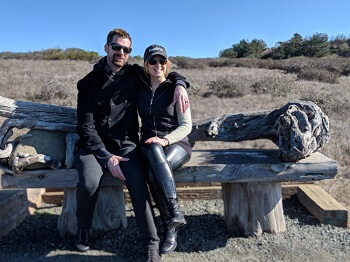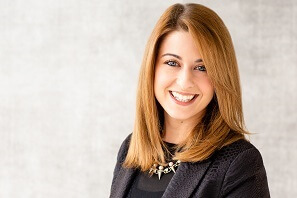Getting to Know the La Piana Team: An Interview with Madison McAleese
This blog post is part of our continuing series featuring the La Piana team. This week, we spoke with Madison McAleese, who joined the firm as Associate Consultant in April 2019.
What attracts you to working with nonprofits, foundations, and/or the consultants who serve them?
I’ve always been interested in service and public work my entire life, but most of that work has been in politics, policy, and international relations. What I didn’t realize was the way that consultants could take that experience and passion and apply it to the field with their clients in advocacy, higher education, health, etc. That is what makes the work super fulfilling for me.
What are three words you would use to describe your new role with La Piana Consulting? 
Challenging (in a good way!), impactful and fulfilling. (Madison McAleese pictured at right, with husband Nathan at Cambria.)
What skills or lessons from your past experience do you expect to draw from the most in your new role? And/or what stands out as a career highlight for you to date?
I’d say most of my past work has been in strategic communications, which I believe is the best skill I could ever imagine having in almost any type of work. It’s especially helpful in this role with writing, editing, and talking to clients.
Although I have many career highlights from different settings, there is one that stands out to me. One of my clients when I was in public relations was an interior designer and she was participating in an annual “make a difference day.” She took that day to redesign a children’s home in Arizona. My job was to create publicity around the work and to highlight the contributions to this amazing cause. Even though I have had many other fulfilling roles, this one really had that feel good impact.
A close second is my experience of helping a board member place a piece about Guantanamo Bay in a really well-known publication while at the Pacific Council on International Policy.
What are your favorite types of challenges/projects/opportunities?
I love challenges that include communications components, like looking at an organization and thinking about whether their identity matches what the community thinks of them. How are they perceived by the public? These are really important questions that need to be asked, and these pieces of communications should be thought of less as side work and instead merged more into all of the work that we do.
What do you most enjoy doing when you’re not working?
I’m super active in my church, where I lead a small group of young professionals that meet weekly. I sit on a women’s committee and I am also currently focused on creating a committee that will focus on international missions’ trips to see where we can focus our work abroad. I also enjoy spending time with my new husband, traveling, family, and wine tasting for sure!
What is your favorite place/sight/sound in the world?
My favorite place is Paris. My favorite sight is Moonstone Beach in Cambria. My favorite sound is the really ridiculous-sounding laugh of my husband!
Is there a book or film that has left a particular impression with you lately, and why?
I’m a political junkie who is open to all opinions, regardless of party. I recently read both of Ben Sasse’s books: The Vanishing American Adult and Them: Why We Hate Each Other and How to Heal. Coming from a U.S. Senator, this is so interesting and thought provoking. It’s all about building community, getting to know your neighbor, taking care of each other. He talks about the causes of loneliness, social media, and the decrease of community involvement, and it’s something that really resonates with me.
Are there ways in which you see the current political climate, or policy challenges, asking nonprofits to step up in a different way (e.g., when even safety net services have become politicized)? What about the role of faith-based groups (e.g., in healing divides, seeking solutions)?
A lot of this goes back to my study in public diplomacy, which is more about people-to-people dialogues and less about one government talking to another government. It’s building bridges and making connections to communities. It’s about impact: the impact that comes from people, nonprofits, and organizations—which is a lot of what our clients do. They are making an impact and serving their own communities. In these times, impact is not really being had on the national level like we once thought. The nonprofits in cities and communities are having to step up and do the work.
Many faith-based groups and mission groups are also part of the shift in impact. These organizations believe that faith should be tied to justice, that it’s not enough to just believe something, it needs to be put into action. We have to do the work that the government can’t, or that the policy makers won’t, do.


Comment section